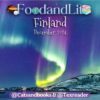

FOOD

COFFEE- steeped
Steeping using a French Press is the recommended brewing method for Kenya coffee beans to unlock the hidden flavors.
RICE – Pilau
Pilau is a popular East African rice dish (especially in Kenya and Tanzania), made by cooking rice with beef, chicken, or vegetables, in broth and spices.
BREAD – Chapati
Chapati Za Ngozi- an unleavened Kenyan flatbread filled with flaky soft layers and pan-fried until golden. Perfect for pairing with tea for a light breakfast or alongside stews.

“ℍ𝕦𝕞𝕒𝕟 𝕣𝕚𝕘𝕙𝕥𝕤 𝕒𝕣𝕖 𝕟𝕠𝕥 𝕥𝕙𝕚𝕟𝕘𝕤 𝕥𝕙𝕒𝕥 𝕒𝕣𝕖 𝕡𝕦𝕥 𝕠𝕟 𝕥𝕙𝕖 𝕥𝕒𝕓𝕝𝕖 𝕗𝕠𝕣 𝕡𝕖𝕠𝕡𝕝𝕖 𝕥𝕠 𝕖𝕟𝕛𝕠𝕪. 𝕋𝕙𝕖𝕤𝕖 𝕒𝕣𝕖 𝕥𝕙𝕚𝕟𝕘𝕤 𝕪𝕠𝕦 𝕗𝕚𝕘𝕙𝕥 𝕗𝕠𝕣 𝕒𝕟𝕕 𝕥𝕙𝕖𝕟 𝕪𝕠𝕦 𝕡𝕣𝕠𝕥𝕖𝕔𝕥.” “𝕋𝕙𝕖 𝕘𝕖𝕟𝕖𝕣𝕒𝕥𝕚𝕠𝕟 𝕥𝕙𝕒𝕥 𝕕𝕖𝕤𝕥𝕣𝕠𝕪𝕤 𝕥𝕙𝕖 𝕖𝕟𝕧𝕚𝕣𝕠𝕟𝕞𝕖𝕟𝕥 𝕚𝕤 𝕟𝕠𝕥 𝕥𝕙𝕖 𝕘𝕖𝕟𝕖𝕣𝕒𝕥𝕚𝕠𝕟 𝕥𝕙𝕒𝕥 𝕡𝕒𝕪𝕤 𝕥𝕙𝕖 𝕡𝕣𝕚𝕔𝕖.“
Wangarĩ Muta Maathai was a Kenyan social, environmental and a political activist and the first African woman to win the Nobel Peace Prize.
In 1977, Maathai founded the Green Belt Movement, an environmental non-governmental organization focused on the planting of trees, environmental conservation, and women’s rights. In 1984, she was awarded the Right Livelihood Award for “converting the Kenyan ecological debate into mass action for reforestation”. Maathai was an elected member of the Parliament of Kenya and between January 2003 and November 2005 served as assistant minister for environment and natural resources in the government of President Mwai Kibaki. She was an Honorary Councillor of the World Future Council. As an academic and the author of several books, Maathai was not only an activist but also an intellectual who has made significant contributions to thinking about ecology, development, gender, and African cultures and religions.
Maathai died of complications from ovarian cancer on 25 September 2011.

A remarkable memoir of courage, faith, and the power of persistence about one woman’s extraodinary journey from her childhood in rural Kenya to the world stage.
“[Maathai’s] story provides uplifting proof of the power of perseverance—and of the power of principled, passionate people to change their countries and inspire the world.”
—The Washington Post
In Unbowed, Nobel Prize winner Wangari Maathai recounts her extraordinary life. When Maathai founded the Green Belt Movement in 1977, she began a vital poor people’s environmental movement, focused on the empowerment of women, that soon spread across Africa. Persevering through run-ins with the Kenyan government and personal losses, and jailed and beaten on numerous occasions, Maathai continued to fight tirelessly to save Kenya’s forests and to restore democracy to her beloved country.
I look forward to September and Kenya.




